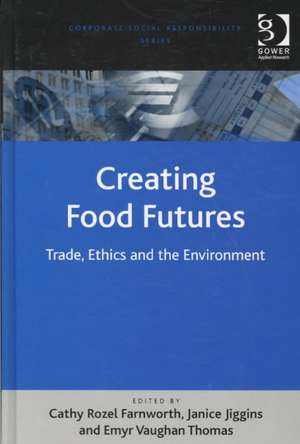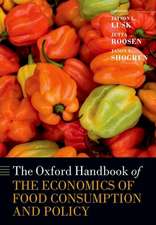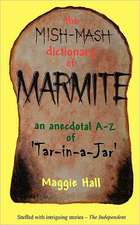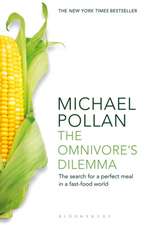Creating Food Futures: Trade, Ethics and the Environment: Corporate Social Responsibility
Autor Janice Jiggins Editat de Cathy Rozel Farnworthen Limba Engleză Hardback – 28 oct 2008
Preț: 1086.70 lei
Preț vechi: 1325.24 lei
-18% Nou
Puncte Express: 1630
Preț estimativ în valută:
208.04€ • 216.25$ • 172.49£
208.04€ • 216.25$ • 172.49£
Carte tipărită la comandă
Livrare economică 06-20 februarie 25
Preluare comenzi: 021 569.72.76
Specificații
ISBN-13: 9780754649076
ISBN-10: 0754649075
Pagini: 270
Dimensiuni: 156 x 234 x 16 mm
Greutate: 0.45 kg
Ediția:1
Editura: Taylor & Francis
Colecția Routledge
Seria Corporate Social Responsibility
Locul publicării:Oxford, United Kingdom
ISBN-10: 0754649075
Pagini: 270
Dimensiuni: 156 x 234 x 16 mm
Greutate: 0.45 kg
Ediția:1
Editura: Taylor & Francis
Colecția Routledge
Seria Corporate Social Responsibility
Locul publicării:Oxford, United Kingdom
Notă biografică
Cathy Rozel Farnworth trained in rural development studies and gender analysis and has lived and worked in developing countries and in Europe. She works on the development of locally defined quality of life indicators, on participatory research and development, and on ethical value chains and marketing. Janice Jiggins trained in history and political science. She has worked in the field in developing countries and in Europe on agricultural development policy, sustainable farming and natural resource management. Janice was Professor of Human Ecology at the Swedish University of Agricultural Sciences and is currently a Guest Researcher at Wageningen University in The Netherlands. She specializes in participatory plant breeding, integrated pest management and in gender equity and social inclusion. Emyr Vaughan Thomas has a doctorate in methodological issues in the study of values and a Master's in environmental policy and planning. He worked on policy issues for many years for an environmental agency and is an Associate Lecturer with the Open University (UK). Emyr has published one book and a range of scholarly papers.
Recenzii
'A thought-provoking mix of insights from different disciplines, discourses and case studies into the challenges in creating a more ethical and fairer food system able to deal with supermarket power, flawed supply chains and inequitable access to resources and power. In the book the meaning of environment, food literacy, fair trade, and the importance of food practices, trade rules and policies all come under scrutiny.' - Geoff Tansey, Joseph Rowntree Visionary for a Just and Peaceful World, Member [and Trustee], Food Ethics Council 'Creating Food Futures is an impressive collection of case studies and analytical reflections on the dynamic changes occurring in agrifood systems around the world. This book will be an important resource in the debates over and proposals for more socially just and environmentally sustainable food and agriculture in the 21st century.' - Douglas L. Murray, Center for Fair and Alternative Trade Studies, Colorado State University ’A thought-provoking collection of essays investigating the potential and the building blocks for a more democratic food system. They challenge both the private sector's growing influence on food governance, and the pessimism that presumes citizens are powerless in the face of this trend. Critical, open-minded and worth a read.’ - Tom Macmillan, Food Ethics, The Magazine of the Food Ethics Council
Cuprins
Chapter 1 Creating Food Futures: Trade, Ethics and the Environment, Cathy Rozel Farnworth, Janice Jiggins, Emyr Vaughan Thomas; Part I The Big Picture: Innovations that Enable Action; Chapter 2 The Retail-Led Transformation of Agrifood Systems, Julio A. Berdegué, Thomas Reardon; Chapter 3 Regulation, Sovereignty and Accountability in the Food Chain, Megan Waples; Chapter 4 Innovation in Policy: The Common Agricultural Policy and Dimensions of Regime Change, Emyr Vaughan Thomas; Chapter 5 The Swedish Foodshed: Re-imagining Our Support Area, Susanne Johansson; Chapter 6 Growing Sustainable Communities: Understanding the Social-Economic Footprints of Organic Family Farms, Matthew Reed, Allan Butler, Matt Lobley; Part II Case Studies: Innovations in Stakeholder and Organisational Relationships; Chapter 7 Balancing Business and Empowerment in Fair Fruit Chains: The Experience of Solidaridad, Irene Guijt, Edith van Walsum; Chapter 8 The FoodTrust of Prince Edward Island, Canada, Woody Wilson; Chapter 9 Beyond Profit Making: Combining Economic and Social Goals in the German Organic Agriculture and Food Sector, Martina Schäfer; Chapter 10 The Cornwall Food Programme, Roy Heath, Mike Pearson; Chapter 11 Ethics in French Wine Cooperatives: Part of a Social Movement?, Yuna Chiffoleau, Fabrice Dreyfus, Jean-Marc Touzard; Part III Changing the Rules of the Game; Chapter 12 Impacts of the Supermarket Revolution and the Policy and Strategic Responses, Julio A. Berdegué, Thomas Reardon; Chapter 13 Supermarkets: A Force for the Good?, Robert Duxbury, Cathy Rozel Farnworth; Chapter 14 Mixing is the Way of the World: A New Social Label, Cathy Rozel Farnworth; Chapter 15 Responsibility in Value Chains and Capability Structures, Jérôme Ballet, Jean-Luc Dubois, François-Régis Mahieu; Chapter 16 Food, Environment, and the Good Life, David E. Cooper; Chapter 17 Conversion or Co-option? The Implications of ‘Mainstreaming’ for Producer and Consumer Agency within Fair Trade Networks, Stewart Lockie; Chapter 18 Towards a New Agenda, Cathy Rozel Farnworth, Emyr Vaughan Thomas, Janice Jiggins;
Descriere
Leading academics and practitioners consider how we trade, process and purchase the food we eat and the many challenges and opportunities that arise from these practices. They offer examples of positive ways forward in food and farming that address issues of social inclusion, environmental sustainability and the evolution of more equitable trade and market relations. Drawing upon inspiring examples of innovative food chains across the globe, Creating Food Futures shows you what is being done and what more could be attempted.


























